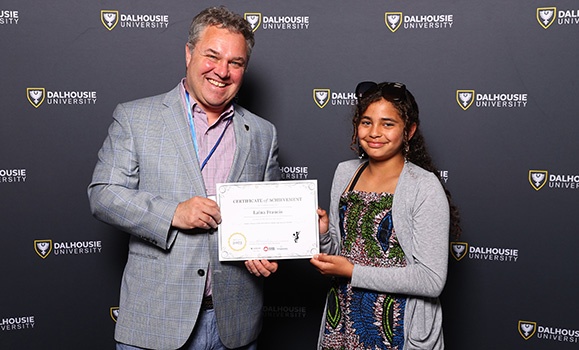Dalhousie Recognizes Nova Scotia’s Junior High Science Excellence at Awards Ceremony
On a sunny and warm Saturday recently, nearly 140 budding young scientists, family members, and guests chose to spend the afternoon inside Dalhousie University’s Life Sciences Centre (LSC).
Arriving from all over the province, they were there to attend an awards ceremony from the Atlantic Science Links Association (ASLA), a charitable science promotion organization that coordinates outreach programs in the province.
Last December, more than 1,300 junior high students from 20 schools and seven Regional Centres for Education (RCEs) took part in ASLA’s second junior high contest, which consisted of a series of multiple-choice tests on a variety of scientific topics curated by faculty volunteers. Funded by the Faculty of Science, Engineers Nova Scotia, and the Natural Sciences and Engineering Research Council (NSERC), the contest encourages students to take an interest in future education and career opportunities in STEM.
The contest was led by Faculty of Science professors Arunika Gunawardena, Rajesh Rajaselvam, and James Brenan, who serve as ASLA’s president, executive director, and board member, respectively.
The top three finishers from grades seven, eight, and nine were presented with cash awards and certificates, with the rest of the top 10, as well as the top scorers from each RCE and independent schools, receiving certificates. Following opening remarks and the announcement of the winners, attendees gathered for a reception in the Steele Ocean Sciences Building.
Shaping future problem solvers
From his seat in the front row, Member of Parliament for Halifax Andy Fillmore remarked that he looked up at the young faces gathered in this “cathedral of learning” and saw “wide eyes, a little bit of apprehension, and a whole lot of excitement.”
After initiating a round of applause to recognize the support of teachers and parents who helped the students along the way, he congratulated the winners and acknowledged the role they will play in the future.
“Science helps us understand how to solve the big problems facing the world, and we’re going to need a lot of great people working on these problems and finding new opportunities, and those people are right in this room today.”
Nova Scotia’s Minister of Education and Early Childhood Development, Becky Druhan, was unable to attend, but wrote a letter congratulating the students, which was read aloud during the ceremony.
Science creates opportunities
Second-year medical student Michaela Kember shared her journey in science with attendees, detailing her transition to university life after being homeschooled and her “Project Medical School” plan for becoming a doctor. After observing a guest lecture from Dr. Gunawardena as an undergrad, Kember was inspired to volunteer in her lab and later become a member, conducting research into plant cell biology.
“There’s no right or wrong type of science to get you to your goals in life,” Kember said, noting that plant research may not seem applicable to a future medical student. “My passion for the topic brought with it opportunities that strengthened me as an individual and as a scientist,” she said, referencing two NSERC undergraduate summer research awards and the chance to present at a national conference.
Having completed bachelor’s and master’s degrees at Dal before starting medical school, Kember also worked with ASLA, helping organize another of its signature outreach events, a conference for grade-school school teachers.
A foundation for success
ASLA first held a junior high science contest in 2019, but the pandemic delayed the next edition until now. “I want to thank the members of our board and our part-time administrative assistant, graduate student Samantha Beal, for their work in planning this,” said Dr. Gunawardena afterward, adding that the contest will be held every other year.
While the awards ceremony represents the first time that some of these future scientists set foot on the Dal campus, it surely won’t be the last.

